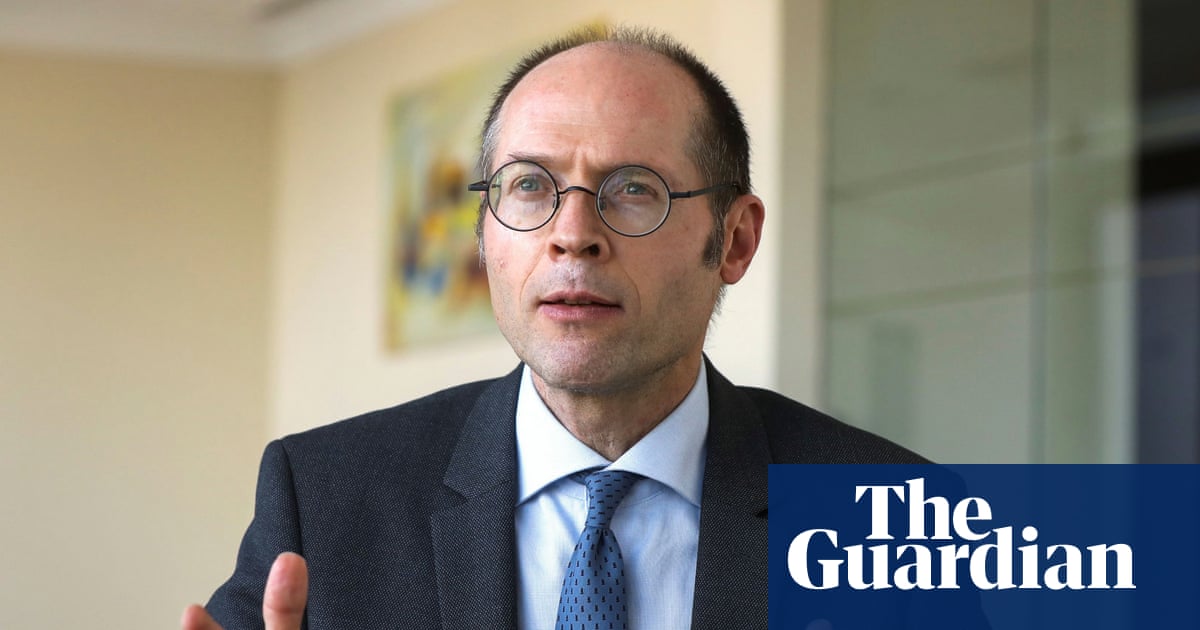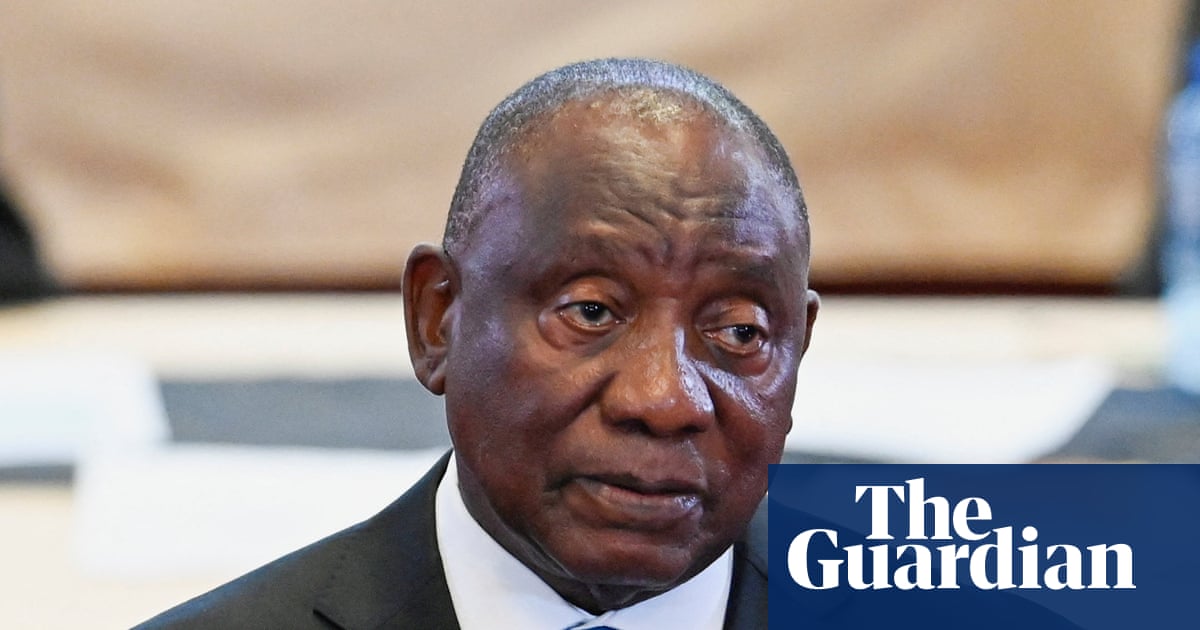Reeves says UK has suffered 'years of economic mismanagement'
Reeves says the UK has great strengths.
But years of economic mismanagement has limited our country’s potential, with long-term issues continually unchecked, potential unrealised.
Key events Show key events only Please turn on JavaScript to use this feature
Reeves says she is not interested in “relitigating old choices”.
Instead, “it’s about being honest with the people, about the consequences” of those decisions.
Reeves says past governments have put 'political convenience' ahead of 'economic imperative'
Reeves says previous government have failed to make the investment decisions Britain needed.
The truth is that previous governments have not adequately faced up to these challenges.
Too often, political convenience has been prioritised over economic imperative.
The decision to pursue a policy of austerity after the financial crisis – that’s a hammer blow to our economy, gutting our public services and severing the flows of investment that would have put our country on a path to recovery.
The years that followed were characterised by instability and indecision … Crucial capital investment continually sacrificed and hard decisions put off again and again.
And then a rushed and ill-conceived Brexit – the further disruption as businesses trying to trade were faced with extra costs and extra paperwork.
All this meant that when the pandemic arrived, our country was underprepared, public services weakened and our economy fragile.
We finished the pandemic with higher tax rates and higher debt, and our peers.
Reeves says UK's productivity is worse than previously assumed
Reeves says at the budget the OBR will set out the conclusions of its review into the supply side of the UK economy.
She says she won’t pre-empt their conclusions.
But it is already clear that the productivity performance the government inherited is worse than thought.
That has consequences for working people, for their jobs, for their wages, and it has consequences for the public finances, too, in lower tax receipts.
She says this is not a reflection on how hard people work. It is about the problems caused because “workers don’t have the tools that they need”, like “trains that run on time”.
Reeves says welfare needs to be reformed.
There is nothing progressive about refusing to reform a system that is leaving one in eight young people out of education, or employment.
Reeves says economic challenges facing UK have got worse since last year's budget
Reeves says she started to fix the foundations in last year’s budget.
I put our public finances back on a firm footing, provided an urgent cash injection into a faltering public services and began rebuilding our economy.
But since that budget, the world has thrown even more challenges our way.
The continual threat of tariffs has dragged on global confidence, deterring business investment and dampening growth.
Inflation has been too slow to come down. And supply chains continue to be volatile, meaning the costs of everyday essentials remain too high and the cost of government borrowing has increased around the world, a shift that Britain, with a high levels of debt left by the previous government, has been particularly exposed to.
And, in an uncertain world we also face pressure to increase our defence spending, and it is right that we do that, protecting ourselves from hostile actors and supporting our allies.
Reeves says UK has suffered 'years of economic mismanagement'
Reeves says the UK has great strengths.
But years of economic mismanagement has limited our country’s potential, with long-term issues continually unchecked, potential unrealised.
Rachel Reeves is speaking now.
She says at the budget she will make the choices necessary for a strong economy.
She says:
It will be a budget led by this government’s values, of fairness and opportunity and focused squarely on the priorities of the British people:
Protecting our NHS, reducing our national debt and improving the cost of living.
You will all have heard a lot of speculation about the choices I will make.
I understand that – these are important choices that will shape our economy for years to come.
I want people understand the circumstances we are facing, the principles guiding my choices – and why I believe they will be the right choices for the country.
This is the passage briefed in advance.
Here are some of the newspaper front pages previewing Rachel Reeves’s speech.
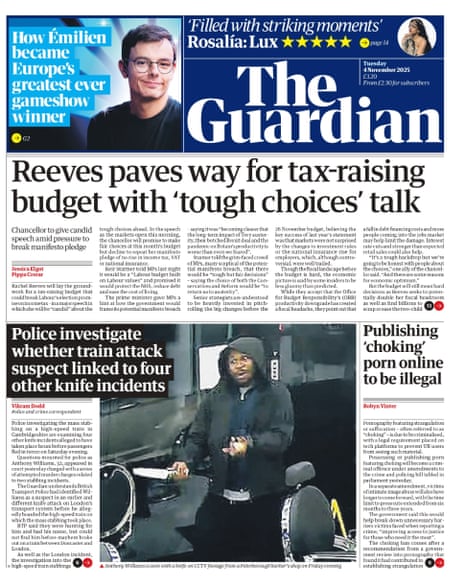

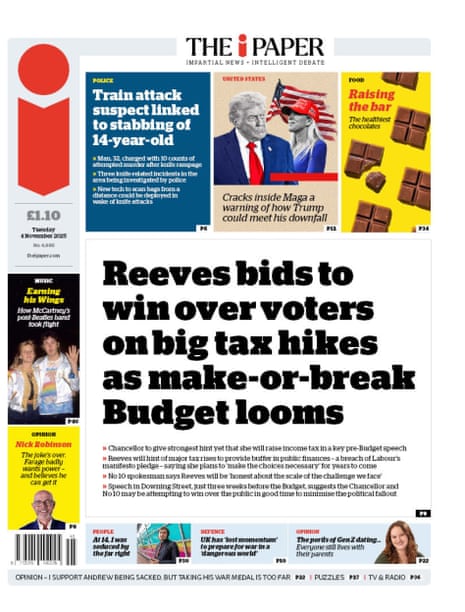
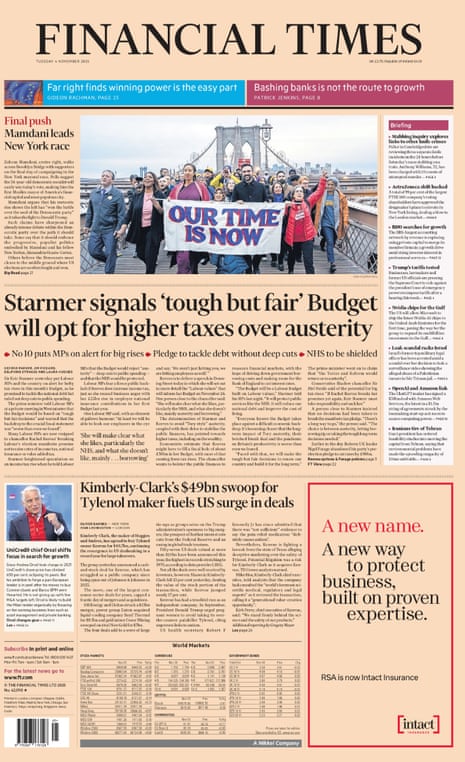
Rachel Reeves is due to start her speech at 8.10. There is a live feed at the top of the blog.
Tax rises at budget ‘inevitable’, Resolution Foundation thinktank warns
This morning the Resolution Foundation, a leading thinktank whose former chief executive, Torsten Bell, is now a Treasury minister helping to write the budget, has published a 40-page report on budget options. As Graeme Wearden reports in his business live blog, it calculates that fiscal consolidation worth £31bn will be needed, involving tax rises worth £26bn.
The Resolution Foundation urge Reeves to take steps to increase her headroom, to as much as £20bn, to send a clear message to markets that she is serious about fixing the public finances.
They have calculated that doubling the fiscal headroom to £20bn and allowing for cost of living support would require £31bn of fiscal consolidation. And with limited scope for spending cuts, tax rises of £26bn are therefore likely to be needed.
Avoiding touching the three big taxes – VAT, income tax and national insurance (NI) – “risks doing more harm than good”, they argue (even though Labour promised in their manifesto not to raise them).
Resolution also argue that the chancellor could offset a 2p rise in income tax with a 2p cut in employee national insurance, raising £6bn while protecting workers from these tax rises.
Graeme has more on his business live blog.
Graeme is covering the chancellor’s speech too. I’ll be focusing more on the political implications and reaction, he will be focusing more on the business and markets implications and reaction, and there should be plenty for us both to say without too much overlapping.
Starmer tells his MPs Reeves will deliver 'Labour budget built on Labour values'
Keir Starmer perhaps gave a clearer hint as to what is coming in the budget when he addressed Labour MPs in private last night at a meeting of the PLP (parliamentary Labour party). This is what Jessica Elgot and Pippa Crerar are reporting in their splash story.
Starmer told MPs on Monday night it would be a “Labour budget built on Labour values” and promised it would protect the NHS, reduce debt and ease the cost of living.
The prime minister gave MPs a hint at how the government would frame its potential manifesto breach – saying it was “becoming clearer that the long-term impact of Tory austerity, their botched Brexit deal and the pandemic on Britain’s productivity is worse than even we feared”.
Starmer told the grim-faced crowd of MPs, many sceptical of the potential manifesto breach, that there would be “tough but fair decisions” – saying the choice of the Conservatives and Reform would be “to return us to austerity”.
MPs in the meeting repeatedly grilled Starmer on whether the budget would lift the two child benefit cap, in what one described as “coordinated” pressure on the prime minister.
MPs in the meeting repeatedly grilled Starmer on whether the budget would lift the two child benefit cap, in what one described as “coordinated” pressure on the prime minister.
While nobody raised concerns over a manifesto breach explicitly, at least one MP spoke about the necessity that the public “know what we stand for”. However, the absence of any direct confrontation over the manifesto may give Starmer and Reeves some confidence that they are not facing a major backlash from within the parliamentary Labour party.
Last night the Treasury released an extract from the speech that Rachel Reeves will give at 8.10am. For the record, this is what she is expected to say.
Later this month, I will deliver my second budget as chancellor.
At that budget, I will make the choices necessary to deliver strong foundations for our economy – for this year, and years to come.
It will be a budget led by this government’s values, of fairness and opportunity and focused squarely on the priorities of the British people:
Protecting our NHS, reducing our national debt and improving the cost of living.
You will all have heard a lot of speculation about the choices I will make.
I understand that – these are important choices that will shape our economy for years to come.
But it is important that people understand the circumstances we are facing, the principles guiding my choices – and why I believe they will be the right choices for the country.
At face value, these words reveal very little; they are what almost any chancellor might say ahead of almost any budget.
But they are being interpreted as confirmation that taxes will go up – and the Treasury is not making any attempt to persuade people that that reading is wrong.
Rachel Reeves to give speech preparing ground for budget tax rises
Good morning. David Cameron is credited with popularising the term “pitch rolling” in Westminster, to describe the process whereby politicians prepare the public for difficult announcements by shaping the argument in advance. It is a metaphor with connotations of a gentle game of cricket, and pleasant summer afternoons.
Today Rachel Reeves is engaged in a classic piece of “pitch rolling”. But her task is more daunting. She won’t be flattening the odd bump; she has to shift some colossal PR obstacles, which is more a task for a fleet of JCB diggers.
That is because, when she delivers the budget three weeks tomorrow, she will have to fill fiscal gap reportedly as high as £30bn. That means tax rises, which are never an easy sell. But it also means going back on the promise she made to the CBI last year when she said she would not need to raise taxes again on the scale she did in autumn 2024. And there seems to be a very real chance that she will also decide to raise income tax, which would be a direct breach of a promise Labour made in its election manifesto.
Reeves is giving what is billed an important speech at 8.10am. As Jessica Elgot and Pippa Crerar report in their preview story, Reeves will “lay the groundwork for a tax-raising budget that could break Labour’s election promise on income tax, in a major speech in which she will be “candid” about the tough choices ahead”.
Here is the agenda for the day.
8.10am: Rachel Reeves, the chancellor, gives a speech in Downing Street.
Morning: Keir Starmer chairs cabinet.
9.30am: The ONS publishes sexual offences crime data sexual offences from the Crime Survey for England & Wales 2024/25.
10am: Kemi Badenoch gives a speech in Westminster.
10.30am: The Commons defence committee takes evidence from journalists about the Afghan data breach.
11.30am: Reeves takes questions in the Commons.
Noon: Downing Street holds a lobby briefing.
After 12.30pm: MPs debate two Tory opposition day motions, one calling for the abolition of business rates for retail, hospitality and leisure premises on the high street, and the other calling for people with “lower-level mental health conditions” to stop getting health and disability benefits, and for reforms to the Motability scheme.
2.30pm: Prof Brian Bell, chair of the migration advisory committee, gives evidence to the Commons home affairs committee.
If you want to contact me, please post a message below the line when comments are open (normally between 10am and 3pm BST at the moment), or message me on social media. I can’t read all the messages BTL, but if you put “Andrew” in a message aimed at me, I am more likely to see it because I search for posts containing that word.
If you want to flag something up urgently, it is best to use social media. You can reach me on Bluesky at @andrewsparrowgdn.bsky.social. The Guardian has given up posting from its official accounts on X, but individual Guardian journalists are there, I still have my account, and if you message me there at @AndrewSparrow, I will see it and respond if necessary.
I find it very helpful when readers point out mistakes, even minor typos. No error is too small to correct. And I find your questions very interesting too. I can’t promise to reply to them all, but I will try to reply to as many as I can, either BTL or sometimes in the blog.

 3 months ago
110
3 months ago
110

